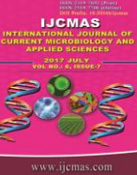


 National Academy of Agricultural Sciences (NAAS)
National Academy of Agricultural Sciences (NAAS)

|
PRINT ISSN : 2319-7692
Online ISSN : 2319-7706 Issues : 12 per year Publisher : Excellent Publishers Email : editorijcmas@gmail.com / submit@ijcmas.com Editor-in-chief: Dr.M.Prakash Index Copernicus ICV 2018: 95.39 NAAS RATING 2020: 5.38 |
Plant growth-promoting rhizobacteria (PGPR) are naturally occurring soil bacteria that aggressively colonize plant roots and benefit plants by providing growth promotion. Inoculation of crop plants with certain strains of PGPR at an early stage of development improves biomass production through direct effects on root and shoots growth. During the past couple of decades, plant growth-promoting rhizobacteria (PGPR) will begin to replace the use of chemicals in agriculture, horticulture, sylvicultural, and environmental cleanup strategies. In this present study, different Rhizobial and Pseudomonas strains from different locations were collected and evaluated for their potential PGP activity. Among ten Rhizobial cultures GNR1 recorded the highest P solubilization zone (24.3 mm) conversely, P solubilization is highest in Pseudomonas isolates. Five cultures of Rhizobia and six cultures of Pseudomonas were able to solubilize potassium. The solubilisation zone is ranging from a maximum of 11.6 to a minimum of 8.3 mm. All the ten Rhizobial cultures and five Pseudomonas cultures were able to release of zinc from insoluble forms of zinc. All the Rhizobial and Pseudomonas isolates were positive for IAA production.
 |
 |
 |
 |
 |